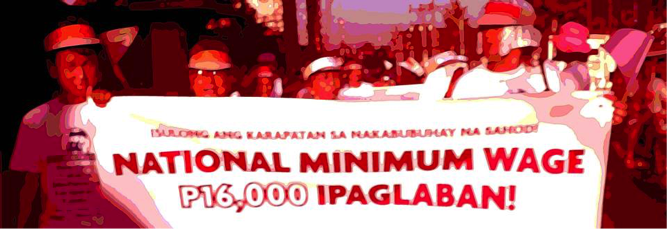On Duterte’s 100 Days, Labor Rights Group Reiterates Demand for Regular Jobs, National Minimum Wage

As the world commemorated the International Day for Decent Work and the Duterte administration marked its 100 days in office last October 7, the Center for Trade Union and Human Rights reiterated the workers demand for regular jobs and a national minimum wage.
“Workers need job security and decent wages in order to live with dignity. Yet policies and laws which promote contractual work and regionalized poverty wages are still in place and continue to deprive workers of the right to decent work. After 100 days of the Duterte administration, we have yet to see a clear policy direction on how the labor department will translate the President’s supposedly pro-labor statements into reality,” Daisy Arago, CTUHR Executive Director said.
According to official statistics at least one of every two wage workers in the Philippines is a contractual employee. In some companies, contract workers could comprise up to 80 to 90 percent of the total workers. Certain industries such as construction, mining, and sales (malls) also have contractual workers comprising majority of its workers.
Meanwhile, Filipino workers are forced to make do with meager wage rates exacerbated by the absence of a national minimum wage. The highest minimum wage rates in the country, pegged at P491 is less than half of the P1,089 family living wage. Wage levels can be much lower in other regions. Despite this, there are still numerous exemptions and violations to the minimum wage.
“We appreciate the labor department’s statements. These are also good for the spirit to keep hoping. But then workers need to fill their and their families’ stomachs with food, send children to school and take rides to work—jobs which they pray will not be taken from them,” Arago said
The group also recognized the labor department’s order for a moratorium on the registration of manpower agencies but underlined that majority of contractual workers employed in sweatshop-like conditions are hired by illegal or unregistered manpower agencies. “Because of this, non-renewal or non-registration of manpower agencies could have little if any impact at all,” the group further stressed.
In a recent study of CTUHR among 120 workers from Valenzuela, of the 31 manpower agencies to which the respondents are hired and employed not even one is duly-registered to the DOLE.
CTUHR also expressed opposition to the win-win solution peddled by the employers under ECOP which transfers the employer-employee relationship from the principal to the manpower agency. “This is no different from the current practice under DO 18-A of the previous administration, and will be worst if DOLE agrees. This means that it will add another layer of legal justification to formalize the non-responsibility or accountability of corporations and companies to the workers employed by them but hired through agencies. This is another way of further legalizing exploitation,” Arago averred.
DO 18-A according to the group is already so exploitative because it essentially liberates the principal capitalists from any liability or responsibility to the workers even as the former use the latter’s labor for years. “In the end, once the contract between the principal and manpower agency is completed or terminated, the workers are left jobless with no guarantee of rightful benefits, etc.,” Arago furthered. The group cited the experiences of 75 workers who were dismissed by Japanese-owned Nakashin Davao International Inc. last June on the grounds of contract termination the manpower agencies that hired these workers.
“We urge the government to not buy the ‘not good for the economy’ reasoning by capitalists. This logic proved to be a big failure in lifting workers out of poverty,” Arago added.
CTUHR also challenged the Duterte administration to come up with a comprehensive and pro-worker labor policy for the next six years which will lay out how its promises of ending contractualization and creating a national wage will be achieved.
“We fully support the workers’ call to repeal Art 106 and 109 of the Labor Code as well as the Wage Rationalization Act of 1989. Only by doing so can the Duterte administration deliver its promises to end endo and implement just wages. The Duterte government would also need to do away with neoliberal policies that continue to push workers to dire conditions.” Arago added.###
